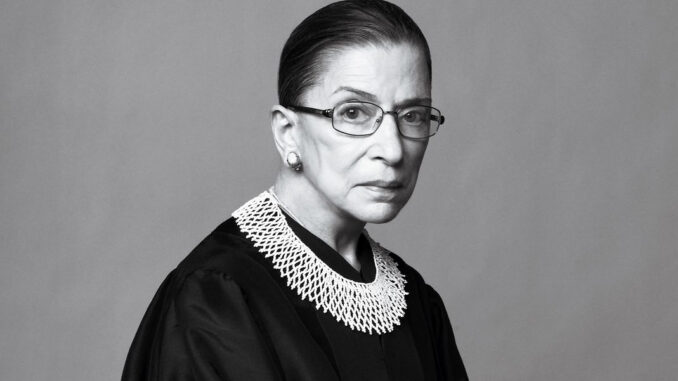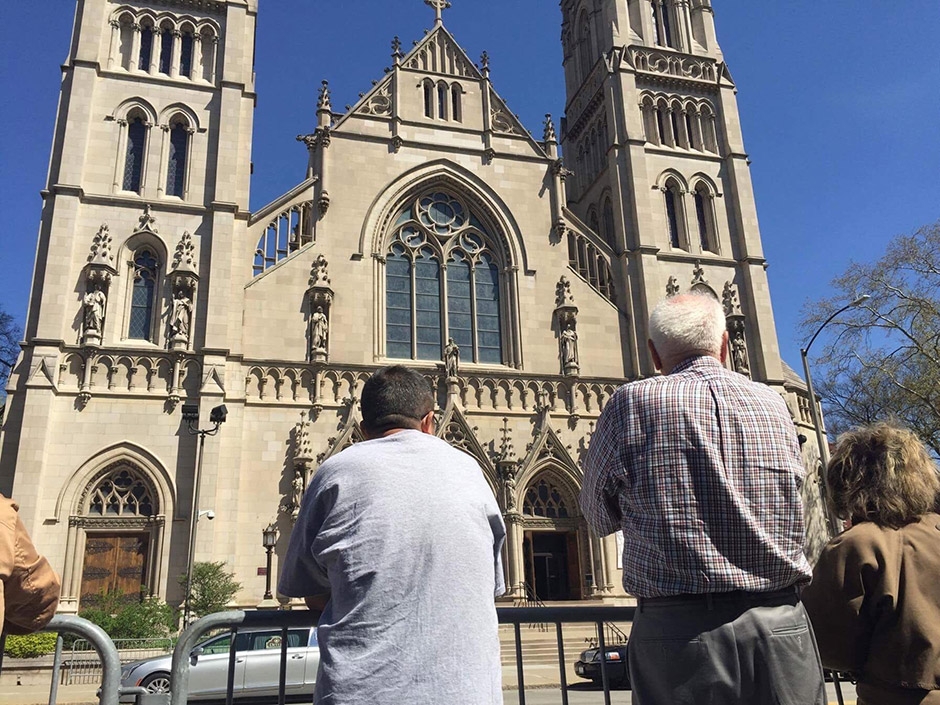
Colleen Hammond | News Editor & Managing Editor
In a year marked by death, tragedy and anxiety, another shining light in American history has gone out.
On Friday, Sept. 18, Supreme Court Justice Ruth Bader Ginsburg died of pancreatic cancer at age 87.
“It’s one of those moments where things stop for a second,” sophomore marketing and theater arts major Anita Parrott said.
Parrott heard the news of Justice Ginsburg’s death while out to eat with friends on Friday night. She stated that a wave of fear and uncertainty washed over her after learning that one of her heroes had taken her last breath.
“Who will replace her? And how will we manage?” Parrott said.
Parrott was not alone in her sadness and anxiety. The nation mourned publicly outside the steps of the Supreme Court and inside their homes with friends and loved ones. Many, like Parrott, began to wonder how the nation would ever replace such an irreplaceable and iconic figure.
Justice Ginsburg, also known in pop culture as “The Notorious RBG,” earned her nickname through a lifetime of trailblazing. In her early years, Justice Ginsburg made a name for herself by becoming one of the first women to make the Harvard Law Review. Before her tenure as the first Jewish, female Supreme Court Justice, Justice Ginsburg quickly rose in the ranks of American lawyers, frequently arguing landmark cases before the very court she would later sit on.
“We’d be living in a very different country if it weren’t for her,” Parrott said.
Her efforts were founded on a mission of equality, and she frequently delivered on her promises to guarantee a level playing field for women. It is because of Justice Ginsburg’s effort to argue the 1973 case Frontiero V. Richardson that women were granted equal protection under the 14th Amendment, stating, “A person’s sex bears no necessary relationship to ability.”
“Justice Ruth Bader Ginsburg was a giant in the law who single-handedly helped to guarantee equal rights for women in our country under the U.S.Constitution,” Duquesne University president Ken Gormley said about his long term acquaintance.
Gormley attended Harvard Law School with Justice Ginsburg’s daughter, Jane, and the two stayed in touch over the years.
“Justice Ginsburg was a tiny woman with a commanding intellect and a warm sense of humor,” Gormley said.
He praised her renowned abilities as a lawyer and judge, but also as a thoughtful and compassionate person.
In 2018, Gormley invited Justice Ginsburg to speak at Duquesne’s First Amendment Symposium. He did not expect to hear a response since she had risen to such heights of power and prominence, yet Justice Ginsburg went out of her way to record a special message for the students and faculty of Duquesne for the Symposium.
“I thought to myself, ‘how remarkable that a person of this stature would take the time to do this, just because I was a friend of her daughter from many years ago,’” Gormley said. “That was the kind of person she was.”
Despite Justice Ginsburg’s shining legacy as a champion for the underdog, many worry that her replacement may not exhibit the same dedication to equality under the law.
“There’s been this one failsafe for these marginalized people, and now she’s gone,” Parrott said.
Parrott fears that the nation’s “tug of war for progress” may have just been lost for decades.
“I don’t want us to have to climb up a mountain just to get where we were,” Parrott said.
Justice Ginsburg was a major influence in the preservation of marriage equality, reproductive rights and gender equality, and Parrott, like many others, fears these movements are already under threat of reversal.
“I don’t think our democracy is as strong as anyone makes it out to be,” Parrott said.
Parrott is not the only one with these fears on campus. Senior women’s and gender studies and theater arts major, Michael Murphy thinks his safety as a gay man will come under increasing threat with the death of Justice Ginsburg.
“I’ve already experienced harassment,” Murphy said.
Murphy, an active member of the LGBT+ community, said he deeply admired Justice Ginsburg for her role in establishing mar- riage equality and transgender access to reproductive care and is saddened by her death.
“She pushed through gay marriage, and she was willing to stay for so long,” Murphy said.
Despite her long and numerous battles with cancer, Justice Ginsburg repeatedly stated her intention to stay on the Supreme Court in defense of equality, justice and the Constitution. Her absence has already sparked a cultural push
toward conservatism, according to Murphy.
“It will get bad socially way before it gets bad legally,” Murphy said.
He noted that although the legal process of overturning progressive rulings may take years, he fears Justice Ginsburg’s death will lead to a “series of backslides” in the country.
Murphy’s fears echoed those of Parrott, as both believe the fight for equality under the law is just beginning.
“We need to not let people convince us an inch is enough,” Parrott said.
Mere hours after the death of Justice Ginsburg, Sen. Mitch McConnell (R-KY) stated his intention to push through a Trump selected nominee for the vacancy as soon as possible. Arguments are brewing in the Capitol as to the fairness of a president nomi- nating a Supreme Court justice so close to the election.
Although Sen. McConnell and his Republican peers argued that a nominee could not be voted on in the last year of a presidency in 2016, they have quickly changed their tune with many eager to start nomination proceedings within the next week.
Both Parrott and Murphy noted that a Trump nominee is a “night-mare scenario.” A conservative Justice added to the court now would tip the scales 6-3, in favor of a conservative majority. This could change the tone of the Supreme Court for decades to come.
Despite their fears and anxieties for the future of the Supreme Court, Parrott and Murphy are hopeful that the death of RBG will inspire others to fight for equality in her name and honor.
While her death is widely regarded as a national tragedy, Justice Ginsburg’s memory and desire for change live on.
“Her presence will be deeply missed; but her legacy will last as long as our nation endures,” Gormley said.




